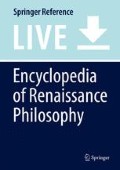Abstract
This entry deals with the concept of predestination, as it was developed in Christian debates in the time of the Renaissance. First, a brief philological introduction will be given, to show the origin of this debate. Second, Augustine’s view of predestination will be examined. Thereafter, the focus will be devoted to the centuries XIV–XVII, first analyzing John Wycliffe and Jan Hus, then Luther and Calvin, Jacob Arminius, the inner-Catholic debate of the so-called “de auxiliis controversy,” and finally turning to competing conceptions of God’s grace within three schools of Roman Catholic thought: the anti-Pelagian, Augustinian-minded school in the Spanish Netherlands – which later lead to Jansenism – the Thomist-Bañezian School in Spain, and the Jesuit Molinist school. In the course of the treatise, the difference between supralapsarianism and infralapsarianism will be clarified. Moreover, it will be necessary to consider several notions that are tightly linked with predestination, such as “grace,” “foreknowledge,” “merit,” “free will,” “election,” and “vocation.”
References
Primary Literature
Augustine. 1962. De Praedestinatione Sanctorum. BA 24.
Calvin, J. 1962. Institutes of the Christian religion (trans: Beveridge, H.). London: Clarke & Co.
Craig, W. 1988. Divine Foreknowledge and Future Contingents from Aristotle to Suárez. Leiden: Brill.
Luther, M. 1823. On the bondage of the will (trans: Henry, C.). London: March.
Waterworth, J. (trans.). 1848. The Council of Trent. The canons and decrees of the sacred and oecumenical Council of Trent. London: Dolman.
Secondary Literature
François, W. 2012. Augustine and the Golden Age of biblical scholarship in Louvain (1550–1650). In Shaping the Bible in the Reformation: Books, scholars and their readers in the sixteenth century, ed. B. Gordon and M. McLean, 235–289. Leiden: Brill.
Leff, G. 1986. Wyclif and Hus: A doctrinal comparison. In Wyclif in his time, ed. A. Kenny, 105–125. Oxford: Clarendon.
Levy, I.C. 2006. Wyclif and the Christian life. In A companion to John Wyclif, ed. Ian C. Levy, 293–364. Leiden: Brill.
Shogimen, T. 2006. Wyclif’s ecclesiology and political thought. In A companion to John Wyclif, ed. Ian C. Levy, 199–240. Leiden: Brill.
Stanglin, K.D. 2007. Arminius on the assurance of salvation: The context, roots, and shape of the Leiden debate, 1603–1609. Leiden: Brill.
Van Eijl, E.J.M. 1994. La controverse louvaniste autour de la grâce et du libre arbitre à la fin du XVIe siècle. In L’Augustinisme à l’ancienne faculté de théologie de Louvain, ed. Mathijs Lamberigts and Leo Kenis, 207–282. Leuven: Peeters/Leuven University Press.
Author information
Authors and Affiliations
Corresponding author
Editor information
Editors and Affiliations
Section Editor information
Rights and permissions
Copyright information
© 2019 Springer Nature Switzerland AG
About this entry
Cite this entry
Gerace, A. (2019). Predestination in Renaissance Philosophy. In: Sgarbi, M. (eds) Encyclopedia of Renaissance Philosophy. Springer, Cham. https://doi.org/10.1007/978-3-319-02848-4_1037-1
Download citation
DOI: https://doi.org/10.1007/978-3-319-02848-4_1037-1
Received:
Accepted:
Published:
Publisher Name: Springer, Cham
Print ISBN: 978-3-319-02848-4
Online ISBN: 978-3-319-02848-4
eBook Packages: Springer Reference Religion and PhilosophyReference Module Humanities and Social SciencesReference Module Humanities

